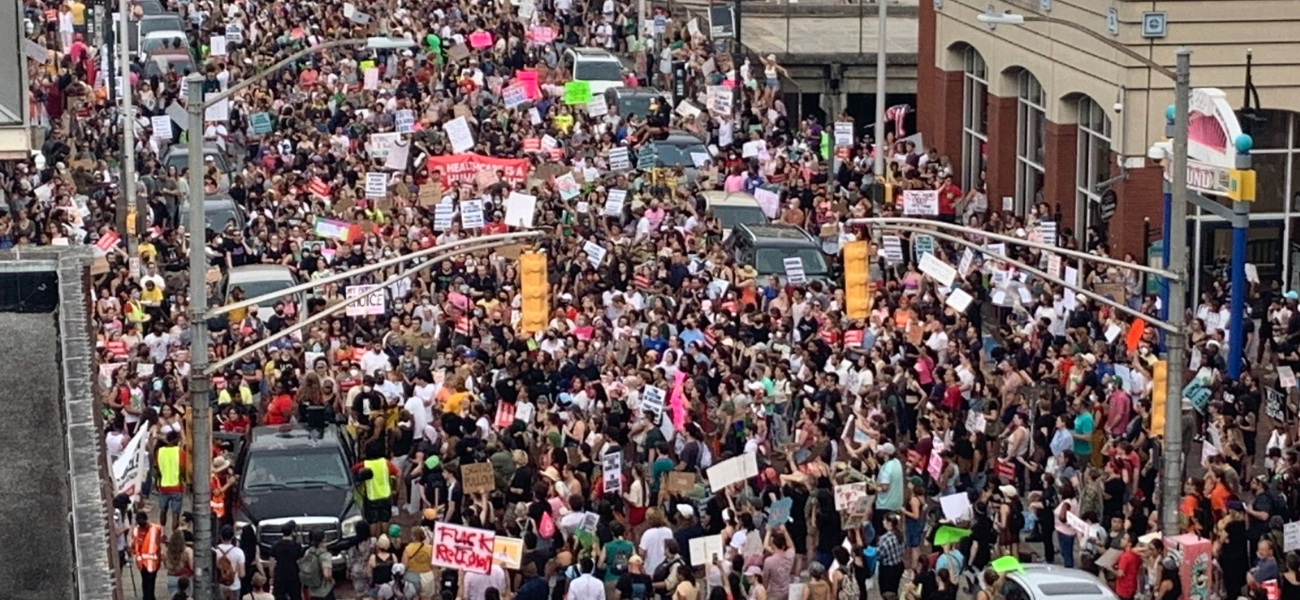Stay ahead of the curve as a political insider with deep policy analysis, daily briefings and policy-shaping tools.
Request a DemoRoe V. Wade Overturned: Will Georgia Be A Battleground For Reproductive Rights?

Credit: Alessandro Marazzi Sassoon
The Gist
The U.S. Supreme Court this morning struck down Roe v. Wade, the landmark 1973 ruling that made abortion access a constitutionally protected right. Abortion is for now still legal in Georgia, but the court’s decision could call into effect Georgia’s 2019 six-week abortion ban (HB 481), which is currently blocked in federal court.
What We Woke Up to On Friday
The High Court ruled 6-3 in the case of Dobbs v. Jackson Women’s Health Organization, overturning the 49-year-old Roe v. Wade precedent, and the subsequent 1992 decision in Planned Parenthood v. Casey, that provided a constitutional right to abortion.
In televised remarks, President Biden said, “Today the Supreme Court of the United States expressly took away a constitutional right from the American people that it had already recognized. They didn’t limit it. They simply took it away. That’s never been done to a right so important to many Americans. But they did it. And it’s a sad day for the court and for the country.”
Biden also called on Congress to act, and pass, national legislation to protect abortion rights.
The decision mostly mirrored the draft opinion leaked in May and penned by Justice Samuel Alito, who said in the opinion, “Roe was egregiously wrong from the start.”

Demonstrators at the Capitol on Friday. (Alessandro Marazzi Sassoon)
What It Means for Georgia
Across the South, several states will have immediate abortion bans become law due to so-called “trigger laws.” In Georgia, that is not the case, but the Supreme Court’s decision makes it very likely that the federal court injunction that is preventing HB 481 from becoming law will fail.
Georgia’s six-week ban virtually bans abortions, because most women are not aware that they are pregnant in the first six weeks of pregnancy. The ban provides exceptions for medical necessity and police-documented cases of rape and incest.
The Georgia Attorney General’s Office today said they had filed a notice with the 11th U.S. Circuit Court of Appeals to allow HB 481 to become law.
“I believe in the dignity, value and worth of every human being, both born and unborn,” said Georgia Attorney General Chris Carr, adding that the Supreme Court decision is “correct and rightfully returns the issue of abortion to the state and to the people – where it belongs,” he said.
Kara Richardson, a spokesperson for Carr’s office, said she could not speak to how quickly the notice would be acted upon by the Circuit Court.
Some legal experts expect the bill to be law in short order, though some say a challenge to the bill in state courts may still be possible.
“The ACLU of Georgia is committed to using every tool at our disposal to keep abortion safe and legal in Georgia,” said Andrea Young, Executive Director of the ACLU of Georgia. Young said the court has given the ACLU 21 days to respond to the Attorney General’s notice.
“ I suspect that we’re looking at a matter of days at this point as far as the federal litigation is concerned,” said Anthony Michael Kreis, a constitutional law professor at Georgia State University. “However, I suspect challengers will ask the Circuit Court to return the case to the District Court for further analysis.”
Meanwhile, protests and demonstrations were expected this afternoon in Atlanta, including outside the Georgia State Capitol.
But across Georgia women feel personally affected by the court’s ruling.
In Macon, 25-year-old Reyna, whose name State Affairs changed to protect her identity, was a 21-year-old university student when she had an unplanned pregnancy with her then-boyfriend. Reacting to the Supreme Court’s decision, she said, “I cried and felt defeated. I’m furious now.”
Georgia has the highest maternal mortality rate in the country, and nearly half of Georgia counties don’t have an OBGYN.
Kwajelyn Jackson, executive director of the Feminist Women’s Health Center, a 46-year-old independent abortion provider in Atlanta, said, “Even though we have been preparing for this eventuality, it does not make it any less devastating.”
Anti-abortion rights activists say their next steps are to prepare for “a post-Roe culture in Georgia.”
“Now more than ever, we need to rally together to prepare for a post-Roe culture in Georgia,” said Elizabeth Reed, Leadership director for the Georgia Life Alliance. “The moment Georgia’s [HB 481] is upheld, women are going to begin receiving calls such as, ‘I’m sorry, but we have to cancel your abortion appointment,’ she said. ”We have to be ready to help them and guide them to the resources they need to step into motherhood with confidence, joy, and support.”
“We are not rolling over and allowing a court steeped in white supremacy to strip away our freedom,” said Monica Simpson, executive director of the SisterSong Women of Color Reproductive Justice Collective. SisterSong is one of several organizations challenging the Georgia legislation in court.

Governor Kemp signs HB 481. (Office of the Governor)
A Battle At the Polls
Today’s Supreme Court decision is expected to weigh heavily in the upcoming November elections.
“Georgia is the next battleground for reproductive freedom, and the basic right of having control over one’s body will now wholly depend on the actions of leaders that we elect at the state level,” said state Sen. Jen Jordan, who is running this November to replace Carr.
Georgia Gov. Brian Kemp hailed the overturn of Roe as “a historic victory for life,” and said he hoped HB 481 “will be fully implemented and ultimately protect countless unborn lives here in the Peach State.”
Democrat Stacey Abrams, who is running for Governor in a rematch election against Kemp this November, posted an online video decrying the decision, saying she was “appalled,” “enraged,” and “disgusted.”
“Women today lost the right to make our own health care decisions,” she said. Calling HB 481 “draconian,” Abrams said, “In Georgia, forced pregnancy is now the law of the land.”
Republican Senate hopeful Herschel Walker, who has said he opposes abortion even in cases of rape and incest, said in a statement: “This Supreme Court decision sends the issue of abortion back to the states, which is where it belongs … I won’t apologize for erring on the side of life.”
His opponent, the Rev. Sen. Raphael Warnock, took to Twitter. “I’m outraged by the Supreme Court’s decision. As a pro-choice pastor, I’ll never back down from this fight. Women must be able to make their own health care decisions, not politicians.”

Abortion rights demonstrators at the Georgia Capitol on Friday. (Alessandro Marazzi Sassoon).
What’s Next
While the Supreme Court’s decision is expected to remove legal blocks on HB 481 in federal courts, the law could still be challenged in state court.
Abortion advocates expect attempts to challenge HB 481 in state court.
“Georgia’s six-week abortion ban is more likely constitutional today than it was yesterday; however, it will still be subjected to rational basis review and will inevitably be challenged under the Georgia Constitution’s more deep and expansive right to privacy,” said Kreis, the constitutional law professor.
What’s more, law enforcement on a local level can choose to de-prioritize policing abortion. Fulton County’s District Attorney has previously said they would not prosecute abortion-related crimes. Atlanta’s mayor Andre Dickens said he supports the city council’s resolution Tuesday that deprioritizes abortion-related crimes for the Atlanta Police Department and bans city funds from being used to investigate alleged abortion crimes.

Abortion rights demonstrators at the Georgia Capitol on Friday. (Alessandro Marazzi Sassoon).
Join the Conversation
What do you want to know about abortion rights in Georgia? Write to [email protected] or on Twitter: @Alemzs
Professionals still face licensing delays amid state’s transition to online system
The Gist Georgia’s professionals and business owners are still struggling to obtain professional licenses in a timely manner. As the Secretary of State’s Office rolls out its new Georgia Online Application Licensing System to expedite the process, the efficiency of this new process is being put to the test. What’s Happening Thursday morning at the …
Controversy over AP African American Studies class grows
Rashad Brown has been teaching Advanced Placement African American Studies at Atlanta’s Maynard Jackson High School for three years. He’ll continue to do so — even though the state’s top education official removed it from the list of state-funded course offerings for the upcoming school year. While Brown prepares to start teaching his class on …
Students, teachers, lawmakers blast decision to end AP African American history classes
ATLANTA — A coalition of lawmakers, civil rights leaders, clergy, educators and students Wednesday called on the state’s education czar to rescind his decision to drop an advanced placement African American studies class from the state’s curriculum for the upcoming school year. “This decision is the latest attack in a long-running GOP assault on Georgia’s …
Kamala Harris’ presidential bid reinvigorates Georgia Democrats
Georgia Democrats have gained new momentum heading into the November election, propelled by President Joe Biden’s decision to bow out of his reelection bid and hand the reins to Vice President Kamala Harris. The historic decision, announced Sunday, is expected to prove pivotal in the national and state political arenas and breathe new life and …




